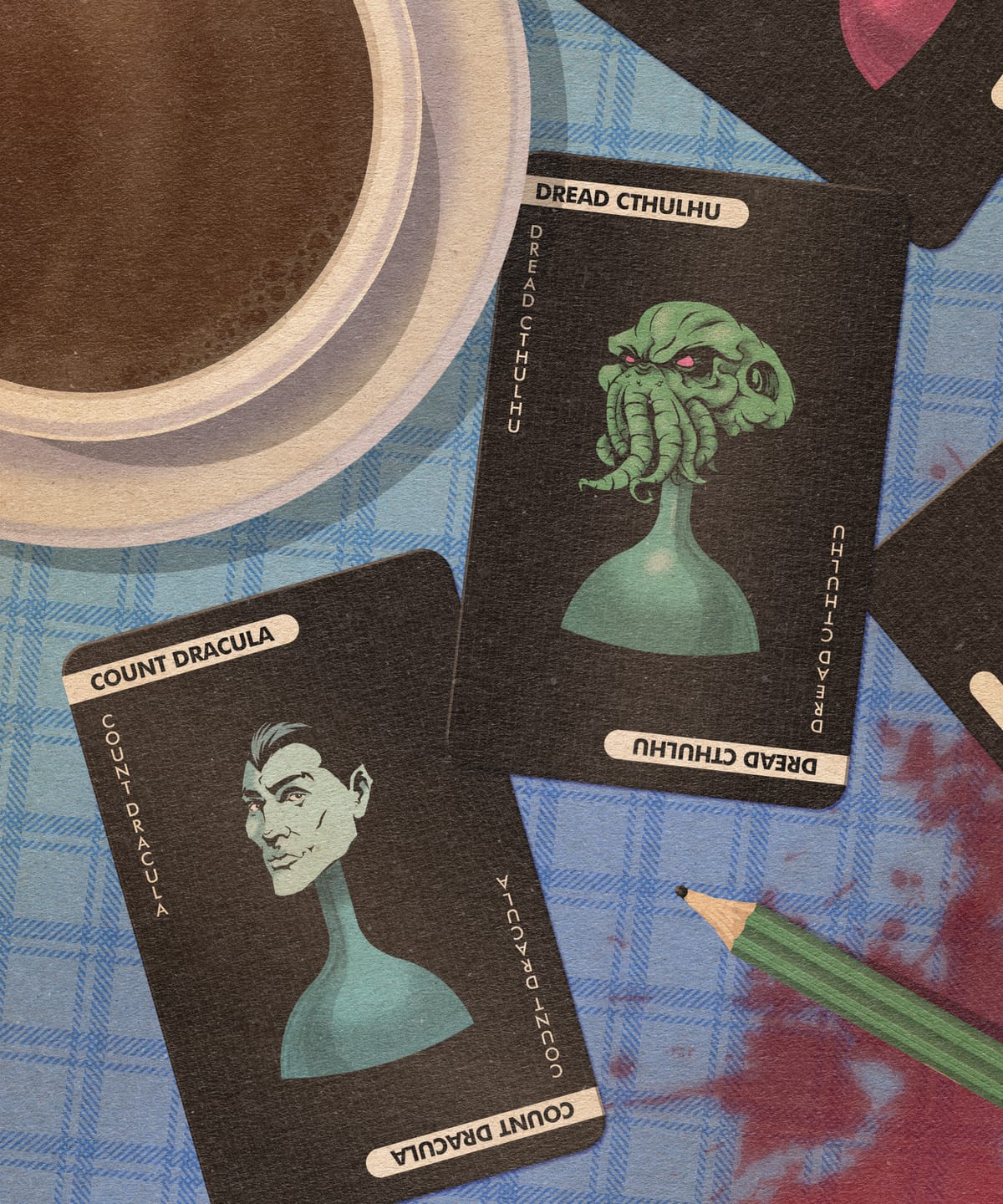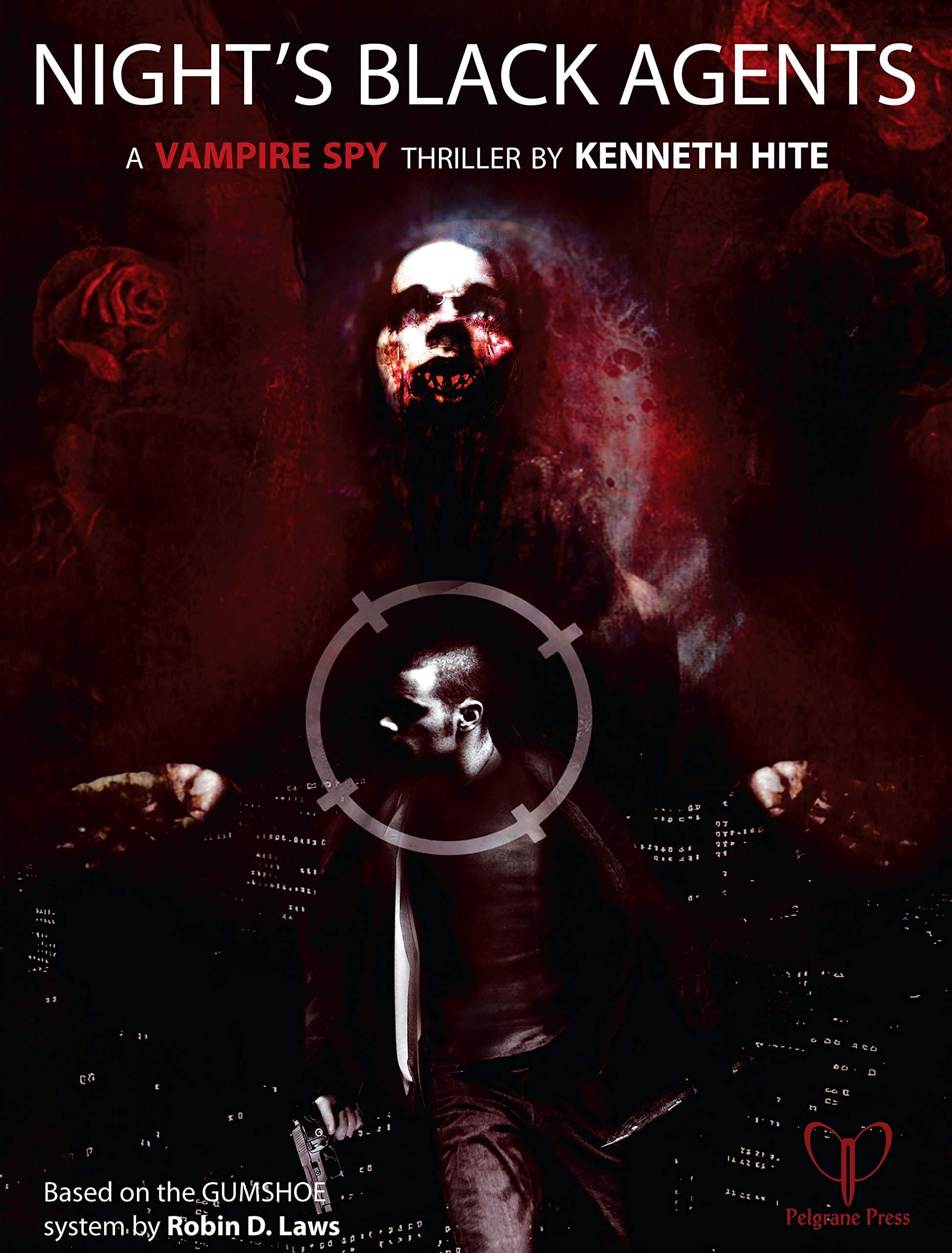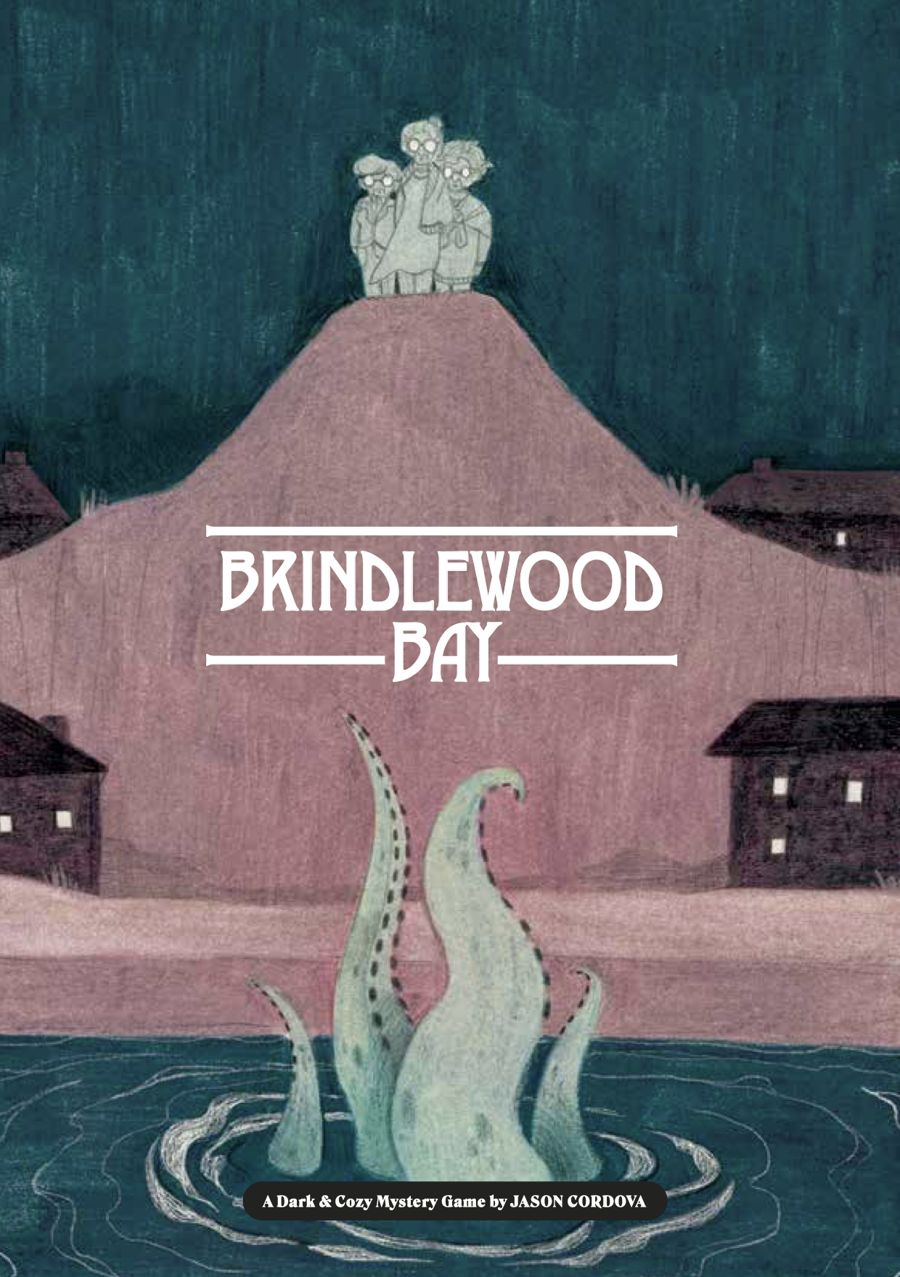
When we get together to play RPGs, we engage in playacting. We put ourselves in another’s shoes to learn about an unfamiliar world, the character we inhabit and ultimately even ourselves. Sometimes those shoes are the sand blasted sandals of a barbarian, sometimes the curly toed slippers of some arcane mage and just sometimes we get to step into the beat-worn brogues of a private investigator out to solve some of life’s mysteries.
‘Investigation in a tabletop RPG is fun and engaging because investigation is part of how we explore, understand, and symbolically defeat dangers within the world,’ explains Kenneth Hite, the veteran game designer behind the some of the best investigative games around. ‘RPGs are about stories, and investigation remains the matter of a whole lot of stories that we find fun and engaging in other media as well as at the table. Plus it gives the weedy academic player characters something to do.’
At least when it comes to RPGs, investigations tend to come hand-in-tentacle with the occult so any exploration of the design of these games risks sacrificing some SAN points dipping into ancient tomes and questioning suspects for insight. Still it’s a price worth paying to delve deeper into the two main mechanical approaches that our investigative games most often take and which best capitalise on the unique strengths of the medium.
Despite how common mysteries are, even in games not solely built around them, surprisingly few games actually place investigative procedures at the centre of their design. Even when it is one of the core gameplay loops you’ll often find far less space in a game’s rulebook dedicated to the unravelling of clues and piecing together of plots than you might for combat, this can be especially jarring in games where that combat is often intended to be an uncommon occurrence.
Investigative abilities are often condensed into just a single skill or two and this lack of mechanical support can easily make creating or running a compelling investigation a challenge. Whilst a skilled GM knows when to improvise or sidestep rules as written, working outside or even against the rules of a game can be a frustrating experience for anyone.
So, how then can you best approach a mystery from a mechanical perspective?
In detective fiction there is the concept of a ‘fair mystery’; this is where the audience is presented with all the information needed to solve the case before any grand reveal. For some readers, part of the experience here is trying to solve the case before the truth is dramatically disclosed and, in many ways, the narrative here is as much a logic puzzle as a story.
Whilst these stories may employ a gentle sleight of hand to obfuscate the importance of clues or use later clues to add context to those provided earlier, making it harder to infer the solution before the conclusion, readers should still feel able to infer or deduce the secret at hand.
Of course in a purely literary mystery solving the puzzle is a bonus, not the entire purpose, and getting it wrong is no less fun than cracking the case. Your experience of reading Murder on the Orient Express isn’t derailed if you don’t know how the murderer got away with their crime, and the book doesn’t sit idle, stalled at a red light, until you somehow catch up. In an interactive medium, however, the audience is also the detective and this creates both a space for new innovations and new frustrations.
The ‘logic puzzle’ approach to a mystery has been adapted for tabletop and computer games many times over and resulted in some of the most celebrated, and notorious, adventures in RPG history. Here players are required to not only find clues and recognise their importance but perform the sorts of deductions that writers often gloss over, a process that can prove infuriatingly linear. Whilst this provides the investigative game player the opportunity to outdo the master detectives; after all, you can ask the suspect whatever question you wish and think outside the box, many a game has ended in exasperation when a player cannot see the intended solution and hence cannot progress any further.
A tabletop RPG with a GM offers an unsurpassable degree of interactivity and responsiveness. The case can be approached from whatever angle the detectives desire, suspects and witnesses can be cross-examined with a degree of care and thoroughness seldom seen in other fictions, and a skilled GM can respond to unexpected inquiries and avenues without rewriting the whole game on the fly.
Still, all this does present a heavy burden on GMs who must create a challenging, but solvable, scenario and be ready to adapt to their clever players asking unexpected questions.
As a result of this many investigative games default to a prewritten mystery and, so, follow an approach closer to the ‘logic puzzle’ school of fiction. At its best a predetermined investigation rewards player intelligence and diligence with a cohesive and engaging story for them to unpick, at its worst it can become an exercise in railroading and frustration. This can be especially the case as whilst the mystery itself may be provided many games do not provide GMs the tools to relieve some of the pressures they face running these types of games.

Today perhaps the premier ruleset for detail-oriented mysteries is The GUMSHOE System. Designed by Robin Laws it was created to specifically to counter the often fatal flaw that he identified with many other investigative RPGs, the reliance on players finding clues. A few unlucky dice rolls or missteps could too often lead to vital information being missed, potentially leading to players being stuck or – in games where investigation might reveal a monster’s weakness or the antagonists’ motives – make it more difficult or outright impossible for the game to to reach a satisfying ending. Not every group enjoys being defeated by Nyarlathotep and its cronies every other week.
GUMSHOE’s system makes finding ‘core clues’ automatic and offers players the option to spend points, rather than rolling dice, for supplemental clues. In addition, nearly all a character’s skills can be used to find and interpret clues. This changes the paradigm from ‘clue collection’ to ‘clue interpretation’, which is both more interesting and encourages players to rely on their own wits rather than the luck of the dice.
If players are ever unsure what to do, the logical course in a GUMSHOE game is to look for more clues and, with almost any skill a potential source of the next revelation, a wide variety of clues is possible. GUMSHOE also offers advice to GM and player alike, its mechanics ease many of the burdens of the genre, such as making it easier to add clues to a mystery on the spot, and since its release has been successfully adapted for numerous horror, science fiction and thriller games.
GUMSHOE’s approach to skills also solves another potential issue: some players choose to portray dumb muscle, characters of limited use when evidence must be analysed, while those playing weedy academics seldom thrive when bullets start flying. By encouraging the use of all skills in investigation, players don’t find themselves largely checked out of half the game.
These approaches are not unique to GUMSHOE of course. Chronicles of Darkness encourages a broader use of skills, such as using the Firearms skills to examine ballistic evidence or even combining it with social attributes to bond with gun enthusiasts. Cthulhu Dark, while much simpler, follows a similar philosophy, and also includes excellent guidance for the GM.
Often with these games a ‘failed’ roll still provides the absolute essentials to progress the story, just without providing additional helpful context. This keeps the game moving but still feels like a consequence as the players don’t receive the bonus information a better roll would have revealed.
One of the first games to utilise the GUMSHOE system, Kenneth Hite's Trail of Cthulhu, outlined a narrative spine, a linear series of loosely arranged scenes for players to move through. While it is easier to write scenarios in this way, this can too easily feel like railroading players. Indeed, one could argue one of the simplest and most effective tricks employed by countless murder mysteries – trapping the cast in a location like an old manor house – is likely to annoy players who may be used to greater freedom in a roleplaying game.

But there is support within the various GUMSHOE games for more complex approaches and Robin Laws credits Hite for the ‘ocean of clues’ approach he took in his later, award winning, vampiric spy thriller Night’s Black Agents. Here clues are scattered between both locations and NPCs allowing players to progress in a nonlinear fashion whilst still keeping a main narrative through-line. Night’s Black Agents also features helpful examples and surprisingly rare guidance for GMs on building a conspiracy or sprawling mystery in the thriller vein.
The setting of the game is also important. The rise of, for example, forensic and video evidence is a mixed blessing for detective stories. Older stories had to rely more on informants and witnesses – who could lie – with fewer objective measures, like fingerprints, available. Changing technology has given the investigator a wider arsenal of tools which can lead to more professional investigations but requires more thought on the part of a GM to ensure the case is not too quickly or easily solved.
Further complicating this ‘logic puzzle’ approach is that not all investigative games are set in our world, and RPGs often visit science fiction or fantasy settings. If magic or technology allows players to speak with the dead, peer into the past or read minds, any scenario must walk a difficult line where player characters’ abilities are not useless but at the same time the case is not solved with a simple cantrip in the first five minutes. In short, the prewritten, ‘logic puzzle’, approach is difficult and requires considerable dedication from a GM both before and during the game.
At this point it’s worth noting that many, if not the majority of mystery stories do not follow the ‘fair mystery’ paradigm. Fictional detectives often possess preternatural skills -such as the ability to recognise a cigarette from its ash- or are granted information -such as the distance between footprints- that the reader, who cannot literally examine the scene of the crime, is excluded from. A story does not need to be a solvable puzzle to be entertaining. just as often the mystery is simply the backdrop and, naturally, many roleplaying games embrace a similar approach.

Arguably the first investigative game was 1981’s Call of Cthulhu – player characters are even referred to as Investigators. The mystery existed primarily as a vehicle to take characters to the game’s actual focus; in this case chilling cosmic horror. Likewise an investigation can also be a vehicle for character development.
Take for example the iconic Noir film The Maltese Falcon which is focused more on the characters, than the details of the case. The case drives the plot, certainly, but by the time we reach the dénouement the question of whodunnit is no longer important. This is something we see replicated in Greg Stolze’s noir RPG A Dirty World, a game which features incredibly robust mechanics for tracking a character’s shifting morality and almost none for investigations. This is not necessarily an oversight; here the character’s inner journey is simply more important.
Jason Cordova, writer of Brindlewood Bay - a game inspired by Murder She Wrote and in which old ladies solve mysteries and gradually uncover an occult conspiracy - praises the Noir genre for ‘dispensing with most of the forensic aspects of the investigation and going straight to shaking down shadowy characters on the docks for information and rescuing femme fatales in over their heads.’
Many games with some kind of ‘roll investigate skill’ approach fall into this school. The mystery is not the point. This approach can, however, still be underwhelming, especially if players want to play detective and have built their character accordingly. In response to this several games have found another way to construct mysteries by embracing another strength of roleplaying as a medium; that it’s not just an interactive space but also a collaborative one, and that many players enjoy creating the world with the GM, not merely playing in their sandbox.
Cordova articulates this philosophy and one of the main issues with a prewritten approach. ‘Traditional mystery games try to present the mystery in the way a film or novel might do it,’ he explains. ‘An orderly sequence of clues, a mystery that can be solved if you do everything just so or ask the right questions.
‘Unfortunately, other mediums have advantages TTRPGs don't have: films have actors and production values, novels have a forced perspective, or can otherwise place the clues in the order you need them to solve the mystery. But TTRPGs have one major advantage other mediums don't have: collaborative storytelling. That's what's at the heart of the Brindlewood Bay mystery system: it harnesses the power of the medium to tell its story.’
In many ways these games take a diametrically opposite approach to the likes of Night’s Black Agents where players investigate a conspiracy carefully constructed in advance by the GM. Brindlewood Bay still allows the GM to create the outline of the mystery through the clues they give, but the actual outcome is somewhat out of their hands, instead here the case is solved when players present a hypothesis and the dice agree.
A similar philosophy is outlined in External Containment Bureau, a game built using the Forged in the Dark ruleset. Players portray operatives of the titular bureau investigating occult phenomena. They collect clues, advance a theory and roll to see if it is correct, incorrect or partially correct all whilst the GM is actively advised to keep the clues and scenario somewhat vague and give players room to come up with their own ideas.
Other games take this even further. Inspectres stating outright that the GM’s job is not to feed clues to the players but to give players the raw material they’ll need to decide what the problem is in the first place. Meanwhile Lovecraftesque plays with the uncertainty of cosmic horror – and avoids the need for a prewritten answer – with players each taking turns to reveal clues that support their version of events, and even altering their theory to accommodate new clues, until a roughly cohesive answer is settled upon.
These games avoid the pitfall of feeling linear and players are unlikely to ever become ‘stuck’ in the way they might in something where the mystery has been predetermined. This framework also dramatically reduces the significant burden on the GM that the puzzle box approach creates. Though, just as the prewritten puzzle box can be linear, railroady or difficult, with improvisational games there is always a risk of what Kenneth Hite describes as ‘he who shouts loudest solves the mystery.’
Ultimately, neither prewritten or improvisational frameworks should be viewed as correct or superior, simply different ways for us to experience being embroiled in mysteries, both criminal and occult, from the comfort of our tables.
Though a prewritten scenario puts far more of the workload on the GM, not only designing a compelling mystery but also guiding players through it without frustrating or railroading them, many love the challenge of creating satisfying mysteries for their players to solve. Likewise whilst a more improvisational game takes much of the pressure of the GM, sharing some of the authorial responsibility between the group, they can sometimes feel a little thematically incoherent and chaotic in comparison to a prewritten mystery.
Unlike our fictional detective stories this is a case where there’s no neat answer at the end but both approaches are at their strongest when they capitalise on and build the unique properties of the RPG medium into their rules. There may be no one size fits all solution but by the nature of their interactivity, tabletop RPGs can create truly memorable investigative experiences for players, letting them experience pounding the detective beat far better than any book, film or computer game.
Brindlewood Bay is out now available from gauntlet-rpg.com
Both Trail of Cthulhu and Night’s Black Agents are available from pelgranepress.com
This feature originally appeared in Wyrd Science Vol.1, Issue 4 (April '23)

